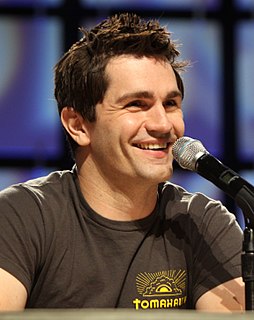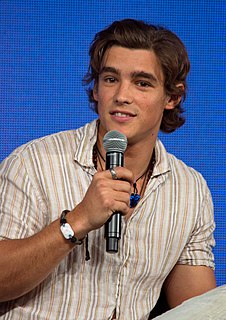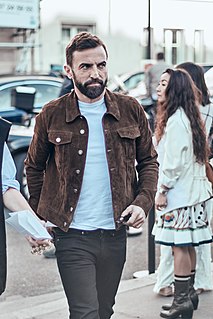A Quote by Paul Verhoeven
I had become a film director because I thought I could express something in an artful way.
Related Quotes
Film’s thought of as a director’s medium because the director creates the end product that appears on the screen. It’s that stupid auteur theory again, that the director is the author of the film. But what does the director shoot-the telephone book? Writers became much more important when sound came in, but they’ve had to put up a valiant fight to get the credit they deserve.
One thing I think is interesting is the Jedi in the prequels are supposed to be peacekeepers, and certainly had a very artful way of making war. They had an artful way of defending themselves and inciting violence, really. You find that the Jedi who survived all of that had a much more simpler way of going about things.
First, there has been a lot of interest in The Drive-in, but, alas, it hasn't actually come to fruition. Maybe soon. Don really got Bubba and I didn't think it could be a film. I thought it was too odd to make it to film. He asked me to do the screenplay, but I declined. I didn't see that it could be a screenplay but he wrote one and proved me wrong. He was always considerate about what I thought about the film and the story's presentation, but in the end, he's the director and he had to make decisions. All good ones.
I left film because I felt that photography was my art. It was something I could do on my own, whereas film was so collaborative. I thought as a photographer I could make something that was artistic and that was mine, and I liked that. And it wasn't until I got back into film and I have very small crews and I could do very tiny filmmaking that wasn't 100 people that I still felt that I was making something artistic as a filmmaker. So, you know, I'm an artist, and whether it's photography or film, I want my voice to be there and I think my voice is very strong in this film.
I got on Twitter because it was a way to express guitar and surfing, and who I was, but now - it's still fun, and I can do that - but I think it's more of a business. I thought it was a personal thing that actors could do themselves, but now it's become a tool that studios are trying to use to sell their movies.
I've always thought that each album would be my last one, and then I would be out of ideas and I would move to photography or something. I thought it was transient and it's not because of this entrenched career stubbornness that I've done it for so long, it's just something I enjoy doing, and it's the most direct way I can express something.
Naturally looking at something will become so important in your aesthetic. For that, you have to be disciplined, too, in the way that there is a moment to catch and there is a moment to express. The moment to express has to be so pragmatic, because you have to build the clothes; you have to be very, very specific about how you want to describe to other people, for the color of the fabric, the way of sewing things, putting things together.
We made 'Mickey and the Bear' with barely any money with a first-time director, a first-time director of photography, and a crew who had just graduated from NYU film school. We were all very much in this together for the first time. There's no famous actor or big explosions. It's not a Marvel movie. I thought nobody was going to see this film.






































